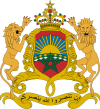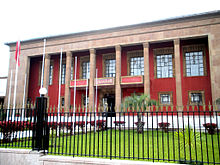- Politics of Morocco
-
Morocco 
This article is part of the series:
Politics and government of
MoroccoConstitutionMonarchyGovernmentJudiciaryDivisions- Administrative divisions
- Regions
- Provinces
- Wilayas
ElectionsForeign policy
Politics of Morocco take place in a framework of a parliamentary constitutional monarchy, whereby the Prime Minister of Morocco is the head of government, and of a multi-party system. Executive power is exercised by the government. Legislative power is vested in both the government and the two chambers of parliament, the Assembly of Representatives of Morocco and the Assembly of Councillors. The Moroccan Constitution provides for a monarchy with a Parliament and an independent judiciary.
On June 17, King Mohamed VI announced a series of reforms that would transform Morocco into a constitutional monarchy.[1][2]
Contents
Executive branch
Main office holders Office Name Party Since King Mohammed VI 23 July 1999 Prime Minister Abbas El Fassi 19 September 2007 The constitution grants the king extensive powers; he is both the secular political leader and the "Commander of the Faithful" as a direct descendant of the Prophet Mohammed. He presides over the Council of Ministers; appoints the Prime Minister following legislative elections, and on recommendations from the latter, appoints the members of the government. While the constitution theoretically allows the king to terminate the tenure of any minister, and after consultation with the heads of the higher and lower Assemblies, to dissolve the Parliament, suspend the constitution, call for new elections, or rule by decree, the only time this happened was in 1965. The King is formally the chief of the military. Upon the death of his father Mohammed V, King Hassan II succeeded to the throne in 1961. He ruled Morocco for the next 38 years, until he died in 1999. His son, King Mohammed VI, assumed the throne in July 1999.
Following the March 1998 elections, a coalition government headed by opposition socialist leader Abderrahmane Youssoufi and composed largely of ministers drawn from opposition parties, was formed. Prime Minister Youssoufi's government is the first government drawn primarily from opposition parties in decades, and also represents the first opportunity for a coalition of socialist, left-of-center, and nationalist parties to be included in the government until October 2002. It was also the first time in the modern political history of the Arab world that the opposition assumed power following an election. The current government is headed by Abbas El Fassi.
Legislative branch
Since the constitutional reform of 1996, the bicameral legislature consists of two chambers. The Assembly of Representatives of Morocco (Majlis al-Nuwab/Assemblée des Répresentants) has 325 members elected for a five year term, 295 elected in multi-seat constituencies and 30 in national lists consisting only of women. The Assembly of Councillors (Majlis al-Mustasharin) has 270 members, elected for a nine year term, elected by local councils (162 seats), professional chambers (91 seats) and wage-earners (27 seats). The Parliament's powers, though limited, were expanded under the 1992 and 1996 constitutional revisions and include budgetary matters, approving bills, questioning ministers, and establishing ad hoc commissions of inquiry to investigate the government's actions. The lower chamber of Parliament may dissolve the government through a vote of no confidence.
Political parties and elections
For other political parties see List of political parties in Morocco. An overview on elections and election results is included in Elections in Morocco.Summary of the 7 September 2007 Assembly of Representatives of Morocco election results Parties Votes % Seats +/- Independence Party (Hizb al-Istiqlal/Parti d'Independence) * 494,256 10.7 52 +4 Justice and Development Party (Parti de la Justice et du Développement) 503,396 10.9 46 +4 Popular Movement (Mouvement Populaire) * 426,849 9.3 41 +14 National Rally of Independents (Rassemblement National des Indépendents) * 447,244 9.7 39 –4 Socialist Union of Popular Forces (Union Socialiste des Forces Populaires) * 408,945 8.9 38 –12 Constitutional Union (Union Constitutionelle) 335,116 7.3 27 +11 Party of Progress and Socialism (Parti du Progrès et du Socialisme) * 248,103 5.4 17 +6 PND–Al Ahd Union (Union PND–Al Ahd)
× Joint list
× National Democratic Party (Parti National-Démocrate)
× Covenant Party (Parti Al Ahd)253,816
139,688
56,176
57,9525.5
3.0
1.2
1.314
8
3
3–3 Front of Democratic Forces (Front des Forces Démocratiques) 207,982 4.5 9 –3 Democratic and Social Movement (Mouvement Démocratique et Social) 168,960 3.7 9 +2 PADS–CNI–PSU Union (Union PADS–CNI–PSU)
× Joint list
× National Congress Party (Parti du Congrès National Ittihadi)
× Democratic Socialist Vanguard Party (Parti de l'Avant-garde Démocratique Socialiste)
× United Socialist Party (Parti socialiste unifié)148,011
98,202
25,695
3,761
20,3533.2
2.1
0.6
0.1
0.46
5
1
—
—+5 Labour Party (Parti Travailliste) 140,224 3.0 5 +5 Environment and Development Party (Parti de l'Environnement et du Développement) 131,524 2.9 5 +3 Party of Renewal and Equity (Parti de Renouveau et de l'Équité) 83,516 1.8 4 +4 Socialist Party (Parti Socialiste) 67,786 1.5 2 +2 Moroccan Union for Democracy (Union Marocaine pour la Démocratie) 76,795 1.7 2 +2 Citizens' Forces (Forces Citoyennes) 31,207 0.7 1 –1 Alliance of Liberties (Alliance des Libertés) 34,801 0.8 1 –3 Citizenship and Development Initiative (Initiative Citoyenneté et Développement) 50,278 1.1 1 +1 Party of Renaissance and Virtue (Parti de la Renaissance et de la Vertu) 36,781 0.8 1 +1 Reform and Development Party (Parti de la Réforme et du Développement) 47,141 1.0 0 –3 Moroccan Liberal Party (Parti Marocain Libéral) 46,526 1.0 0 –3 Democratic Independence Party (Parti Démocratique et de l'Indépendance) 31,105 0.7 0 –2 Action Party (Parti de l'Action) 24,384 0.5 0 ±0 Social Centre Party (Parti du Centre Social) 22,826 0.5 0 ±0 Party of Hope (Parti de l'Espoir) 16,376 0.4 0 ±0 Party of al-Badil al-Hadari (Parti d'al-Badil al-Hadari) 15,600 0.3 0 ±0 Democratic Socialist Party (Parti Socialiste Démocratique) 10,973 0.2 0 –6 Renaissance Party (Parti Annahda) 10,156 0.2 0 ±0 Party of Liberty and Social Justice (Parti de la Liberté et de la Justice Sociale) 5,452 0.1 0 ±0 Others 1.7 5 +5 Total (turnout 37%) 325 Source: MAP * Members of the outgoing coalition government Judicial branch
The highest court in the judicial structure is the Supreme Court, whose judges are appointed by the King. The Youssoufi government continued to implement a reform program to develop greater judicial independence and impartiality. Morocco is divided into 16 administrative regions; the regions are administered by the Walis and governors appointed by the King.
Administrative divisions
As part of a 1997 decentralization/regionalization law passed by the legislature 16 new regions (provided below) were created. It is the primary administrative division of Morocco : Chaouia-Ourdigha, Doukkala-Abda, Fes-Boulmane, Gharb-Chrarda-Beni Hssen, Greater Casablanca, Guelmim-Es Smara, Laayoune-Boujdour-Sakia El Hamra, Marrakech-Tensift-El Haouz, Meknes-Tafilalet, Oriental, Oued Eddahab-Lagouira, Rabat-Sale-Zemmour-Zaer, Souss-Massa-Draa, Tadla-Azilal, Tangier-Tetouan, Taza-Al Hoceima-Taounate
Morocco is divided also into 37 provinces and 2 wilayas*: Agadir, Al Hoceima, Azilal, Beni Mellal, Ben Slimane, Boulemane, Casablanca*, Chaouen, El Jadida, El Kelaa des Sraghna, Er Rachidia, Essaouira, Fes, Figuig, Guelmim, Ifrane, Kenitra, Khemisset, Khenifra, Khouribga, Laayoune, Larache, Marrakech, Meknes, Nador, Ouarzazate, Oujda, Rabat-Sale*, Safi, Settat, Sidi Kacem, Tangier, Tan-Tan, Taounate, Taroudannt, Tata, Taza, Tetouan, Tiznit; three additional provinces of Ad Dakhla (Oued Eddahab), Boujdour, and Es Smara as well as parts of Tan-Tan and Laayoune fall within Moroccan-claimed Western Sahara
International organization affiliations
ABEDA, ACCT (associate), AfDB, AFESD, AL, AMF, AMU, EBRD, ECA, FAO, G-77, IAEA, IBRD, ICAO, ICCt, ICFTU, ICRM, IDA, IDB, IFAD, IFC, IFRCS, IHO (pending member), ILO, IMF, IMO, Intelsat, Interpol, IOC, IOM, ISO, ITU, NAM, OAS (observer), OIC, OPCW, OSCE (partner), UN, UNCTAD, UNESCO, UNHCR, UNIDO, UPU, WCO, WHO, WIPO, WMO, WToO, WTrO
References
External links
- Government at the official portal of Morocco
- Morocco list at the CIA Chiefs of State and Cabinet Members, March 17, 2011
- Morocco Government at the Open Directory Project
Politics of Africa Sovereign
states- Algeria
- Angola
- Benin
- Botswana
- Burkina Faso
- Burundi
- Cameroon
- Cape Verde
- Central African Republic
- Chad
- Comoros
- Democratic Republic of the Congo
- Republic of the Congo
- Côte d'Ivoire (Ivory Coast)
- Djibouti
- Egypt
- Equatorial Guinea
- Eritrea
- Ethiopia
- Gabon
- The Gambia
- Ghana
- Guinea
- Guinea-Bissau
- Kenya
- Lesotho
- Liberia
- Libya
- Madagascar
- Malawi
- Mali
- Mauritania
- Mauritius
- Morocco
- Mozambique
- Namibia
- Niger
- Nigeria
- Rwanda
- São Tomé and Príncipe
- Senegal
- Seychelles
- Sierra Leone
- Somalia
- South Africa
- South Sudan
- Sudan
- Swaziland
- Tanzania
- Togo
- Tunisia
- Uganda
- Zambia
- Zimbabwe
States with limited
recognition- Sahrawi Arab Democratic Republic
- Somaliland
Dependencies and
other territories- Canary Islands / Ceuta / Melilla / Plazas de soberanía (Spain)
- Madeira (Portugal)
- Mayotte / Réunion (France)
- Saint Helena / Ascension Island / Tristan da Cunha (United Kingdom)
- Western Sahara
Categories: - Administrative divisions
Wikimedia Foundation. 2010.

